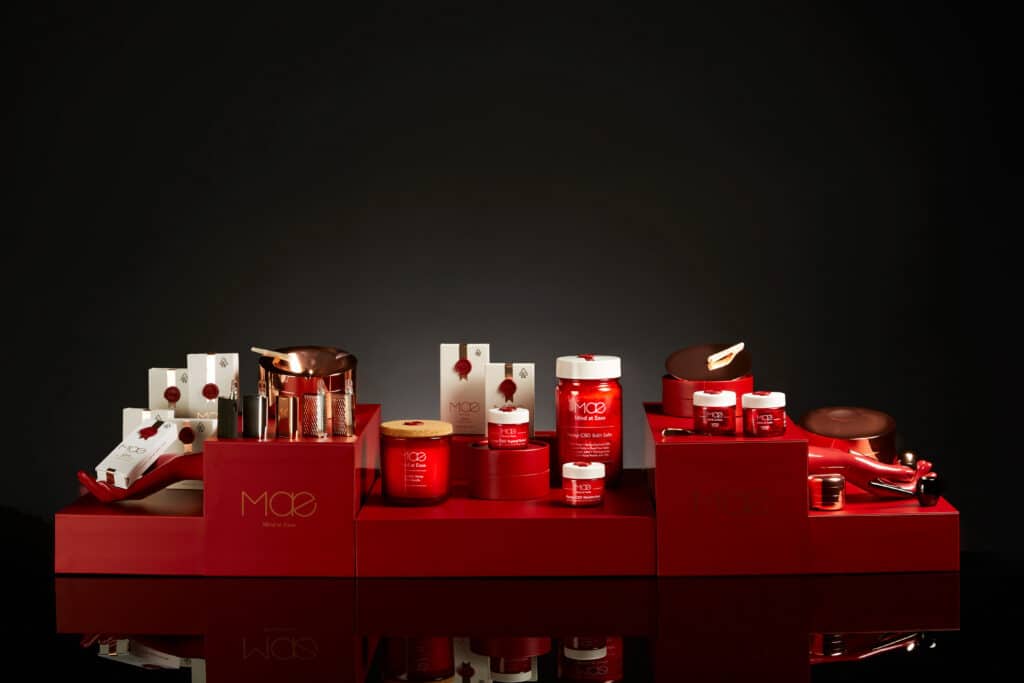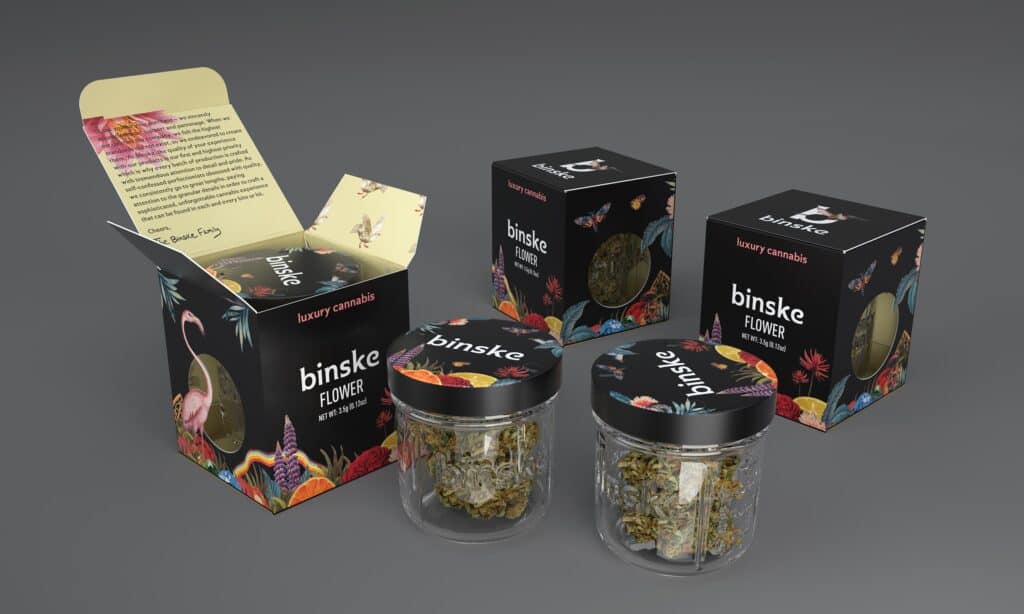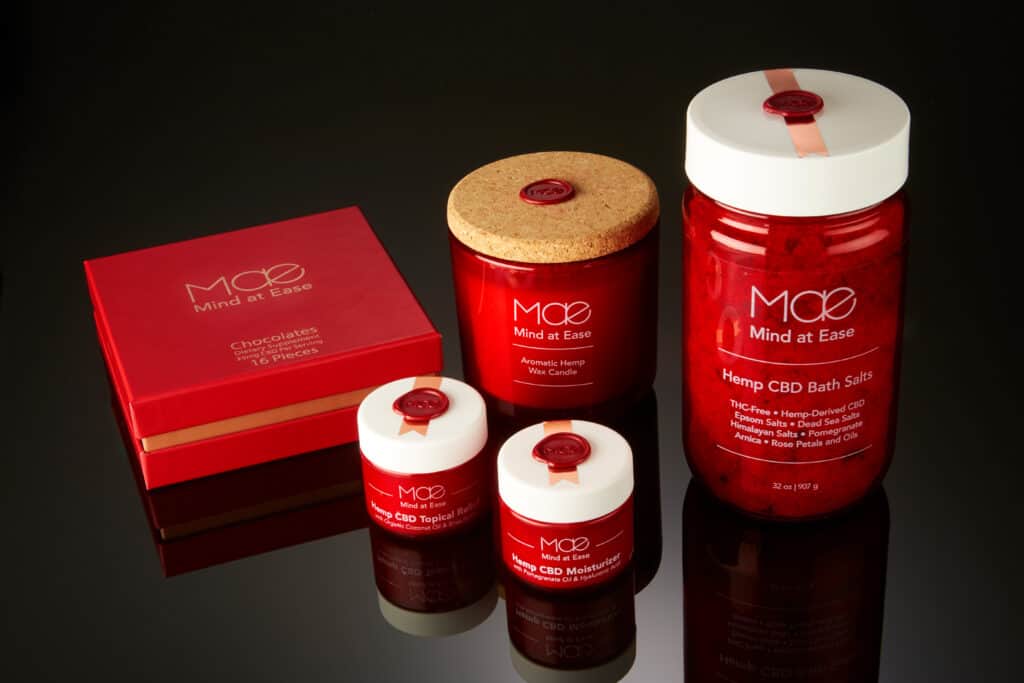It’s been four years since The New York Times declared Beboe “the Hermès of Marijuana.” Since then, dozens of new brands have entered the scene hoping to appeal to the growing luxury market. These brands offer high-end designs, gorgeous packaging and marketing, artisanal ingredients, exclusive experiences, and compelling stories.
While the explosion of creativity in the luxury cannabis space is exciting, few have successfully achieved the exalted status of a true lifestyle brand—where loyal fans view anything the brand touches as an expression of their own values or identity. Think Gucci, Yves Saint Laurent, or of course Hermés.
That’s because most of their offerings are limited to plant-touching products—like Canndescent, which sells flower and pre-rolls in stylish boxes that evoke French face creams; or Kiva Confections, with its fine edibles; or infused beverages like Saka, Klaus, and Artet with their artistic bottles.
These are all great luxury product brands. But until cannabis is federally legal, it’s hard to imagine a brand that’s limited to consumable plant-touching products achieving the kind of broad recognition and rabid following that defines lifestyle brands, especially in the luxury space.
Here are five luxury cannabis lifestyle brands that stand out from the pack, going beyond their competition in creative and interesting ways.
MAE
Unveiled in late 2020, MAE (an acronym for Mind At Ease) focuses on two things: “Design and discretion,” says founder Armen Gregorian, a fashion industry veteran who ran Twelfth Street by Cynthia Vincent and ALC. Gregorian’s market research showed that those were the two most important attributes female cannabis users were looking for. MAE delivers on both counts.
Gregorian collaborated with superstar designer Joe Doucet to create a gorgeous line of modern minimalist vape devices and weed accessories, including a rose gold-plated pipe, grinder, humidor, ashtray, water pipe, and roach clip. “We wanted to create something worthy of being in a lady’s beauty bag,” says Gregorian.



Beyond the products themselves, MAE’s marketing drips with elegance. The company’s Instagram feed features dozens of sultry images of models holding a thin rose gold vape pen. The aesthetic evokes Audrey Hepburn in Breakfast at Tiffany’s.
To satisfy his customers’ desire for discretion, Gregorian worked with a lab in LA to create a proprietary formulation for MAE’s vape pens and cartridges that is completely odorless. He also eliminated the LED light, a standard feature of most vape pens. “You don’t need it to light up like that.”
MAE also sells pre-rolls, low-dose vape cartridges, and infused organic chocolate bars. The lower THC content of MAE’s vapes was another need that turned up in Gregorian’s research. Higher-end users are not looking for maximum potency, he says. They prefer to control their dosage. “I call it the rosé of cannabis.”
What really sets MAE apart, however, is Gregorian’s vision for expansion.
“We want to do for cannabis what Dunhill did for tobacco,” he says. That luxury British cigarette and menswear brand brought an air of fashion to the tobacco world with its high-end smokes and its sleek lighters and cigarette boxes, favored by icons like Hunter S. Thompson and James Bond.
MAE just added a line of CBD products to its catalog, including vape cartridges, bath salts, moisturizers, and candles. In the coming months, MAE will launch a line of organic hemp clothing as well.

This focus on non-THC products will enable MAE to reach a national audience and establish a strong direct-to-consumer channel, which Gregorian hopes will position his brand at the front of the line when federal legalization happens.
binske
The most ambitious brand in the luxury lifestyle space, by far, is binske (the ‘e’ is silent, so it’s pronounced “binsk”). Launched in Colorado in 2015 by brothers Jake and Alex Pasternack, binske offers a huge catalog of “cultivated satisfaction,” featuring 160 different plant-touching SKUs, including 98 different proprietary strains of flower, along with gummies, chocolate bars, fruit leathers, tinctures, and olive oils. Binske also sells rolling papers, vape batteries, and tons of branded swag.
The beautiful art on binske’s packaging and marketing materials has earned numerous awards, with detailed illustrations of birds, tigers, skeletons, flowers, and mushrooms that give the brand an air of playful sophistication.

Pasternack thinks they can be the first cannabis brand to become an international household name, and their key strategy for efficient growth is that Binske is not actually a plant-touching company. Rather, it’s a marketing company that licenses its intellectual property — plant genetics, product recipes, packaging, etc. — to local producer-processors in each state or territory where it operates, then tightly manages those relationships to ensure quality.
That approach has made it much easier for binske to raise investment and expand into new states, new countries, and maybe even an eventual IPO. The company just closed a $15 million fundraising round, for a total of $27 million to date. Last February, binske’s parent company inked a licensing deal to expand the brand to Canada and is currently exploring additional partnerships in Europe and South America.
To underscore the point, Pasternack tells me that this winter he plans to open a flagship retail store in Miami. Since Florida does not yet allow legal adult use, the store won’t sell any cannabis products, but instead will feature a line of clothing from a well-known L.A.-based designer (whose name he won’t reveal), along with binske-branded swag and accessories.
“Think about that,” Alex says with a wry smile. “We’re a cannabis brand, and our flagship store won’t sell cannabis.”
Pasternack compares binske’s business model to that of Supreme, the iconic streetwear brand famous for slapping its red and white box logo on everything from salt shakers to sneakers to sports cars. “They started out as a skateboard shop,” says Alex. “But I guarantee you, today, less than one percent of Supreme’s revenue comes from selling skateboards.”
If you haven’t had a chance to see binske’s products up close and you happen to be in Las Vegas, stop by MedMen’s Paradise location. Through November 7, binske has taken over virtually the entire store, with signage covering the front windows and back wall, and a majority of the floor space dedicated to showcasing their products. All MedMen staff will wear binske t-shirts throughout the takeover, and will offer customers three promotional deals: 1) Buy any binske product, get a 100mg pack of gummies for $0.01. 2) Buy any flower product, get a free pack of rolling papers. 3) Buy any vape product, get a free 510 battery.
Sundae School
Speaking of streetwear, several cannabis-related brands have emerged in recent years, including Cookies, Mister Green, and 40 Tons. But the one that has pushed the genre furthest past t-shirts, caps, and hoodies and into the realm of high fashion is Sundae School.
Based in Seoul and New York, Sundae School sells both weed and clothing, with a strong emphasis on the latter. The imagery and “smokewear” designs on the brand’s website and Instagram playfully combine the irreverent edginess of American streetwear culture with the bubbly aesthetic of K-pop fandom and dumb stoner jokes.
It’s a style that creative director Dae Lim calls “yellow counterculture.” And Sundae School manages to pull it off with a level of artistry that no other streetwear brand I’ve seen can match. When Lim, 28, and his younger sister and cofounder Cindy, 25, launched the brand in 2017, the campaign for their “Genesis” collection used the clever catchphrase “When tigers used to smoke,” which is the traditional Korean way to start a children’s story, equivalent to “Once upon a time.” Their spring 2020 collection, “Genesis Renaissance,” reimagined “7 days of creation, in which God is high every day.”
Sundae School’s pre-fall 2021 collection is titled “Summer We Drew.” It imagines a post-COVID world with optimistic hand-drawn floral imagery. Check out the season’s lookbook on Hypebeast, or watch the campaign video below.
Two standout celebrity brands playing in the luxury lifestyle lane
A parade of celebrities have launched their own cannabis brands in the past few years—from rappers Snoop Dogg, Wiz Khalifa and Common to folk and rock icons Carlos Santana, Melissa Etheridge, Mickey Hart, and Willie Nelson, to comedians Jim Belushi and Tommy Chong.
While some celebrity brands make an effort to appeal to a higher-end, luxury aesthetic, most feel more like vanity projects, glorified fan merchandising vehicles aimed at cashing in on the attached celebrity’s stoner cred. But two stand out as having more serious potential to become standalone luxury lifestyle brands: Jay-Z’s Monogram and Seth Rogen’s Houseplant.
Monogram
Jay-Z’s cannabis brand has established itself firmly as a leader in the luxury lane, with its high-end matte-black packaging and prices—like the $50 OG Handroll joint. Monogram’s strains have names like No.01, No.03, No.96, and No.88, all references to important dates in Jay-Z’s life. The brand’s aesthetic, messaging and branding approach downplays the connection to Jay-Z, focusing instead on the slogan “the good life, redefined,” illustrated by imagery of chic black models recreating a series of famous photos taken by the pool at Frank Sinatra’s home in Palm Springs in the late 1960s. Even though it only offers plant-touching products for now, Monogram has real potential to break out as a luxury lifestyle player among urban millennials.
Houseplant
Comedian Seth Rogen’s entry into the cannabis space also has some of the necessary ingredients to break out as a higher-end lifestyle brand. It has a playful retro stoner-chic aesthetic and a focus on cool accessories like hand-crafted $300 ceramic ashtrays, artistic table-top lighters, and bongs that look like my grandmother’s glassware. Rogen features fairly prominently on the Houseplant website, but in a way that feels humble and welcoming—like he’s just your stoner buddy inviting you over to spin some vinyl in his man cave and show off his cool paraphernalia, which, of course, he’s more than happy to sell you.
The luxury cannabis market is still in its infancy. As legalization spreads, bringing in millions of new consumers, there is plenty of room for innovation. It may take years before we see a luxury lifestyle brand emerge that can seriously claim the title of the Hermès of marijuana. But from where we sit, these brands have a pretty good head start.




